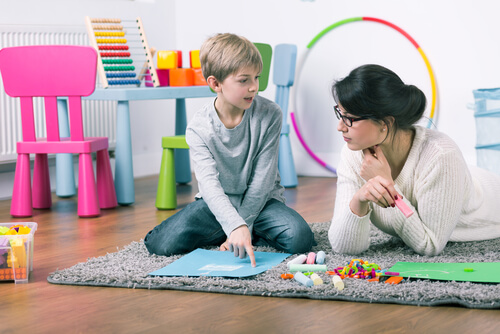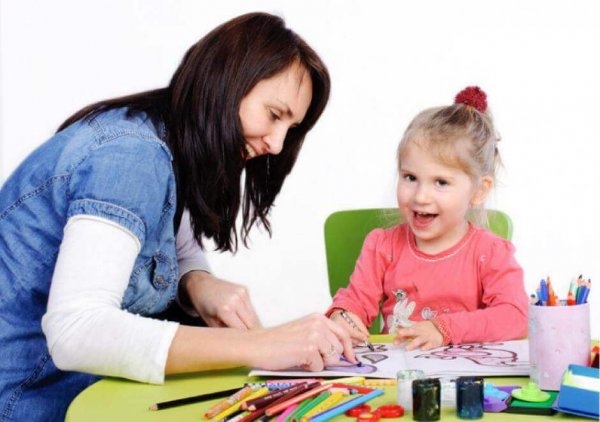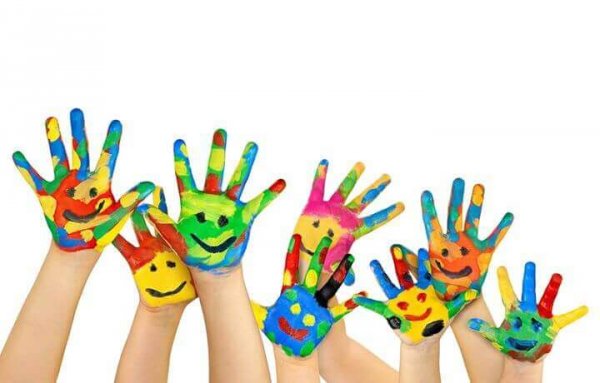Child Psychology - Who Should I Trust?

One of the most frequent questions in psychology consultations is related to situations that parents face with the upbringing of their children. Most don’t require therapy, but just a professional response to relieve their uncertainty. In these cases, we find that many parents don’t know exactly which type of expert to contact; a psychologist, a pediatrician or an educational psychologist. So what are the options in child psychology?
Most parents usually go to a pediatrician because it’s what they’ve always done, but it may make more sense to see a specialist in child psychology. Others go to the child’s school for help. They often find that the psychologist there is more focused on the problems of teaching and development of the children.
Many people continue to confuse the work of a psychologist with that of an educational psychologist. It is true that in some areas there is a very fine line that separates both these professions. However, we are talking about two very different roles. Where these two disciplines most unite is in the academic framework. Here they usually work side by side, complementing and combining the different skills to try and solve possible problems in the teaching-learning processes.
Child psychology – the different options
Both disciplines study the human being and the ultimate objective is to intervene and assist. That’s why we sometimes have difficulty when it comes to differentiating the two. Throughout this article we will list the main differences and similarities of these professions that have been connected since their inception. After all, in the very names of the professions we find the same prefix, “psycho”.
The main difference between psychology and educational child psychology is that psychology has a broader vision that involves all aspects of life, while educational psychology pays specific attention to the learning process.
All of us know something. We all ignore something. Therefore, we always learn. The purpose of education is to show people how to learn for themselves. The other concept of education is indoctrination
-Noam Chomsky-

Professional competences in different work environments
The educational psychologist acts in different areas, such as orientation and psycho-educational intervention. These fields require a set of knowledge, methodologies and theoretical principles to be used. This enables the execution of preventive, corrective or supportive actions, from multiple models, areas and principles, and all address different contexts.
Within the different areas of counselling in educational child psychology, we have orientation in teaching-learning processes. This focuses on the acquisition of learning techniques and strategies and on the development of metacognitive strategies and motivation. In this approach to the different profiles of the professions we will try to clarify the different guidelines and objectives of the disciplines (Palacio, López and Nieto, 2006).
Regarding professional skills, the educational psychologist acts by preventing, detecting, and dealing with problems related to learning, regardless of the age of the affected person. In addition, they work with educational programs and different techniques to facilitate the teaching process.
On the other hand, the psychologist is more focused on a global, and at the same time specific, knowledge of the person. Their expertise is very broad, even within the educational field. It ranges from the management of emotions and thoughts to the management of interpersonal relationships.
Know all the theories, master all the techniques, but as you touch a human soul be just another human soul. The meeting of two people is like the contact of two chemical substances: if there is a reaction, both are transformed
-Carl Jung-

Main differences between the profile of a psychologist and an educational psychologist
The professional profiles of these two fields have a lot in common, but also aspects that distinguish them. The work of the educational psychologist focuses specifically on learning, underlying processes, and behaviors. However, there are exceptions where experts in this field work within companies to improve the quality of life of organizations and employees.
The work of the educational psychologist is also closely related to integration. They provide support for children and adolescents with difficulties, and monitor children who have a troubled home life.
One of the tasks of the psychologist in these areas is the detection of anomalous or conflicting behaviors in children. They then establish the treatment and guidelines that should be followed in order to correct these behavior patterns. If the child’s personality is affected then they may work in conjunction with a psychiatrist, and may use medication in the treatment.

Child psychology – the school environment
In the school environment, the main function of the educational psychologist is to guide the child using specific strategies to achieve particular results.
There are two basic models in psychological education: the clinical model and the consultation model. Psychologists, on the other hand, deal with more emotional areas. They look at the evolutionary stages of human development, behavior, personality, vocation, work and social phenomena.
In contrast, the educational psychologist specializes, as we have seen, in the learning processes of a person throughout their life. If a problem is specific to the educational environment, it would be a better idea to use the professional help of an educational psychologist. Whereas if the problem also involves psychological processes, it would be more appropriate to go to a general psychologist.
Education has two objectives: to educate skills and to educate feelings. One without another takes away their meaning.
-Ruben Alves-

References
Bravo, V. (2009). Educational psychology, Psychopedagogy and Special Education.
Castro Solano, A. (2004). The professional competencies of the psychologist and the needs of professional profiles in the different work environments. Interdisciplinary, 21 (2), 117-152.
Manzanares Moya, A. (2004). Expertise and the Educational Psychologist: an integrating vision of the spaces of action in the professional family of education.
Bordón: Journal of Pedagogical Orientation, 56 (2), 289-302.Palacio.
C. R., López, G. C. H., & Nieto, L. Á. R. (2006). What is Educational Psychological intervention: definition, principles and components.
The Agora USB Medellín-Colombia, 6 (2), 215-226.
Pérez Solís, M. (2011). Can an educational psychologist play the role of a psychologist? Professionalization against professional intrusion.
Estud. Psicol. (Campinas), 28 (1), 3-13
One of the most frequent questions in psychology consultations is related to situations that parents face with the upbringing of their children. Most don’t require therapy, but just a professional response to relieve their uncertainty. In these cases, we find that many parents don’t know exactly which type of expert to contact; a psychologist, a pediatrician or an educational psychologist. So what are the options in child psychology?
Most parents usually go to a pediatrician because it’s what they’ve always done, but it may make more sense to see a specialist in child psychology. Others go to the child’s school for help. They often find that the psychologist there is more focused on the problems of teaching and development of the children.
Many people continue to confuse the work of a psychologist with that of an educational psychologist. It is true that in some areas there is a very fine line that separates both these professions. However, we are talking about two very different roles. Where these two disciplines most unite is in the academic framework. Here they usually work side by side, complementing and combining the different skills to try and solve possible problems in the teaching-learning processes.
Child psychology – the different options
Both disciplines study the human being and the ultimate objective is to intervene and assist. That’s why we sometimes have difficulty when it comes to differentiating the two. Throughout this article we will list the main differences and similarities of these professions that have been connected since their inception. After all, in the very names of the professions we find the same prefix, “psycho”.
The main difference between psychology and educational child psychology is that psychology has a broader vision that involves all aspects of life, while educational psychology pays specific attention to the learning process.
All of us know something. We all ignore something. Therefore, we always learn. The purpose of education is to show people how to learn for themselves. The other concept of education is indoctrination
-Noam Chomsky-

Professional competences in different work environments
The educational psychologist acts in different areas, such as orientation and psycho-educational intervention. These fields require a set of knowledge, methodologies and theoretical principles to be used. This enables the execution of preventive, corrective or supportive actions, from multiple models, areas and principles, and all address different contexts.
Within the different areas of counselling in educational child psychology, we have orientation in teaching-learning processes. This focuses on the acquisition of learning techniques and strategies and on the development of metacognitive strategies and motivation. In this approach to the different profiles of the professions we will try to clarify the different guidelines and objectives of the disciplines (Palacio, López and Nieto, 2006).
Regarding professional skills, the educational psychologist acts by preventing, detecting, and dealing with problems related to learning, regardless of the age of the affected person. In addition, they work with educational programs and different techniques to facilitate the teaching process.
On the other hand, the psychologist is more focused on a global, and at the same time specific, knowledge of the person. Their expertise is very broad, even within the educational field. It ranges from the management of emotions and thoughts to the management of interpersonal relationships.
Know all the theories, master all the techniques, but as you touch a human soul be just another human soul. The meeting of two people is like the contact of two chemical substances: if there is a reaction, both are transformed
-Carl Jung-

Main differences between the profile of a psychologist and an educational psychologist
The professional profiles of these two fields have a lot in common, but also aspects that distinguish them. The work of the educational psychologist focuses specifically on learning, underlying processes, and behaviors. However, there are exceptions where experts in this field work within companies to improve the quality of life of organizations and employees.
The work of the educational psychologist is also closely related to integration. They provide support for children and adolescents with difficulties, and monitor children who have a troubled home life.
One of the tasks of the psychologist in these areas is the detection of anomalous or conflicting behaviors in children. They then establish the treatment and guidelines that should be followed in order to correct these behavior patterns. If the child’s personality is affected then they may work in conjunction with a psychiatrist, and may use medication in the treatment.

Child psychology – the school environment
In the school environment, the main function of the educational psychologist is to guide the child using specific strategies to achieve particular results.
There are two basic models in psychological education: the clinical model and the consultation model. Psychologists, on the other hand, deal with more emotional areas. They look at the evolutionary stages of human development, behavior, personality, vocation, work and social phenomena.
In contrast, the educational psychologist specializes, as we have seen, in the learning processes of a person throughout their life. If a problem is specific to the educational environment, it would be a better idea to use the professional help of an educational psychologist. Whereas if the problem also involves psychological processes, it would be more appropriate to go to a general psychologist.
Education has two objectives: to educate skills and to educate feelings. One without another takes away their meaning.
-Ruben Alves-

References
Bravo, V. (2009). Educational psychology, Psychopedagogy and Special Education.
Castro Solano, A. (2004). The professional competencies of the psychologist and the needs of professional profiles in the different work environments. Interdisciplinary, 21 (2), 117-152.
Manzanares Moya, A. (2004). Expertise and the Educational Psychologist: an integrating vision of the spaces of action in the professional family of education.
Bordón: Journal of Pedagogical Orientation, 56 (2), 289-302.Palacio.
C. R., López, G. C. H., & Nieto, L. Á. R. (2006). What is Educational Psychological intervention: definition, principles and components.
The Agora USB Medellín-Colombia, 6 (2), 215-226.
Pérez Solís, M. (2011). Can an educational psychologist play the role of a psychologist? Professionalization against professional intrusion.
Estud. Psicol. (Campinas), 28 (1), 3-13
This text is provided for informational purposes only and does not replace consultation with a professional. If in doubt, consult your specialist.







